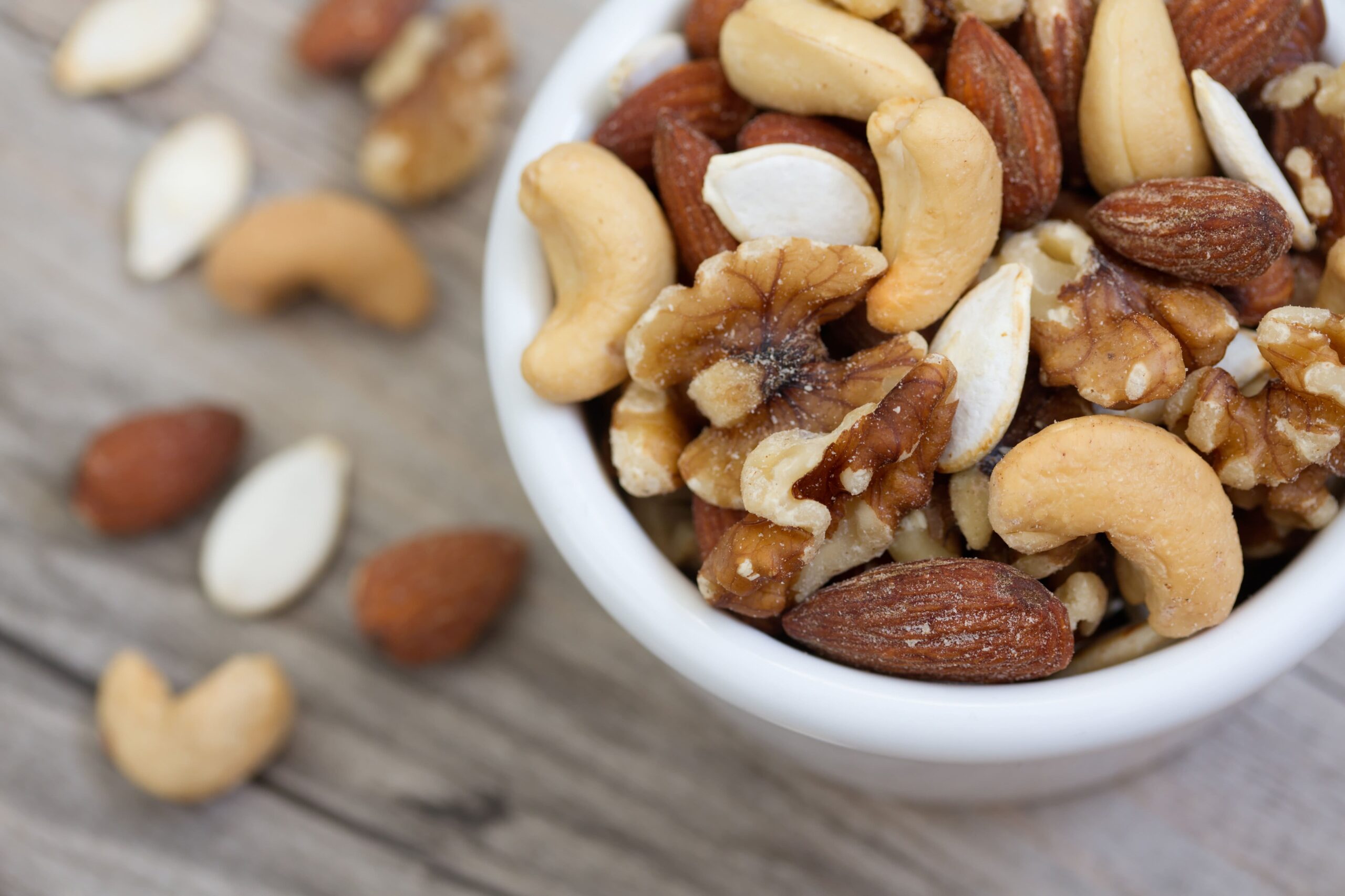
Weight loss, heart health, and anti-depressant qualities make nuts ideal snacks
When it comes to snacking, are you nuts about nuts? If you are, you could be on to a good thing.
Read More »• The first is a research study that shows that snacking on mixed tree nuts—Brazil nuts, cashews, almonds, macadamias, hazelnuts, pine nuts, pecans, walnuts, and pistachios—helps you reduce weight, lowers your blood pressure, and protects your heart.
People obtain about a quarter of their calories daily from eating snacks, says Maureen Ternus, executive director of the International Tree Nut Council Nutrition Research & Education Foundation.
A large amount of these calories comes from sugar-sweetened beverages, desserts, salty snacks, and sweets, she says.
If you replace only one of those snacks with 1.5 ounces of mixed tree nuts you can boost your overall health and cut the risk of contracting a variety of chronic diseases, she adds.
• The second new research analysis argues that snacks based on peanuts are not only nutritious but also have the benefit of being affordable.
Faced with rising food costs, consumers are looking for recipes and meals that stretch their dollars, point out representatives of the Peanut Institute. Peanuts and peanut butter are among the most nutrient-dense and affordable sources of protein that are available, they add.
A one-ounce serving of peanuts—or about a handful—costs about 15 cents, the institute representatives point out. It delivers 7 grams of plant-based protein as well as fats that are heart-healthy, 19 minerals and vitamins, and fiber.
Replacing animal-based protein with that from plants can help to add years to your life, says Dr. Samara Sterling, a nutrition scientist who is research director for the institute.
If you make smart food choices every day it adds up to a lifestyle that is healthy and beneficial for both you and your family, Sterling adds.
Detailed look at studies
Here’s a more detailed look at each study.
Mixed tree nuts benefits
A study at the University of California-Los Angeles found that tree nuts had a positive impact on the metabolism of tryptophan—an essential amino acid. Tryptophan has been found to be a significant factor in preventing heart disease. It produces many bioactive metabolites in the digestive tract. These substances are important in regulating a person’s immune system, particularly when it comes to chronic ailments such as heart disease and diabetes.
Positive effects also were seen in obese and overweight people.
Built on earlier study
The new study built on an earlier study in which researchers at the University of California-Los Angeles showed that eating 1.5 ounces of tree nuts a day—instead of pretzels—over 24 weeks lowered blood pressure, caused weight loss, and decreased a person’s heart rate. It also made those people eating the nuts feel full.
In the latest study, researchers gathered stool and plasma samples from 95 people who were obese or overweight. They evaluated the effects of eating tree nuts on them over 12 weeks as well as over 24 weeks.
Researchers have known for some time that tree nuts can help to lower the risk for heart attacks, says Dr. Zhaoping Li, professor of medicine and chief of the Division of Clinical Nutrition at the University of California-Los Angeles. The new findings provide an explanation for why this is so.
Tree nuts found to be good for your heart
The researchers found new links in obese and overweight people between tryptophan metabolites and their heart rate, blood pressure, and feelings of being full, Li explains.
The new findings also suggest that tryptophan has a broader impact on a person’s overall health, including your heart health.
Serotonin findings seen as significant
Another significant finding was that blood serotonin levels rose markedly from their baselines at the start of the study on mixed tree nuts. The increase was 60% after 12 weeks of eating tree nuts and 82% after 24 weeks.
This study was the first time that researchers have linked the eating of mixed tree nuts with an increase in the levels of serotonin in the body, Li says.
The findings are exciting because serotonin can have a significant impact on a person’s overall mental health and mood.
Peanuts’ health benefits
Because peanuts are packed with minerals and vitamins, both peanuts as well as peanut butter deliver long-term as well as short-term benefits that can positively impact every stage of your life, the Peanut Institute says.
Here are some of the benefits of peanuts found in studies and listed by the institute:
• Healthy development of bones, the brain, immune system, and muscles in children.
• Healthy management of weight in adults. Because peanuts provide increased hunger satisfaction, those who snack on peanuts and peanut butter tend to eat foods with fewer calories than other nuts, including almonds, the institute says.
• Antioxidants in peanuts provide protection from skin, brain, colon, stomach, pancreatic, breast, and prostate cancers.
• Eating peanuts keeps a person’s mind sharp when they are aging. They also fight against depression and anxiety and protect a person against Alzheimer’s disease.
The Peanut Institute also points out that because peanuts technically are legumes, they are easier to grow and to harvest than tree nuts.
They require less water, they enrich the soil with nitrogen which makes it more fertile, and they produce fewer greenhouse gases, the institute says.





